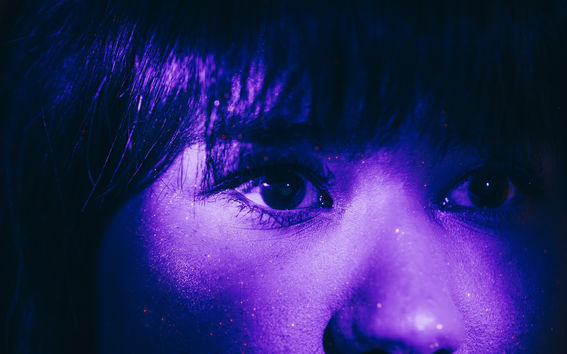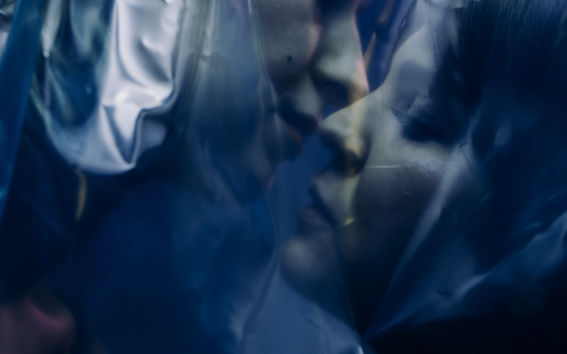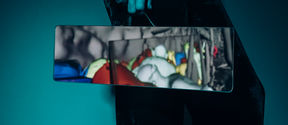Is artificial intelligence capable of love?

‘I wanted to reflect on the essence of love in my thesis because it’s a powerful subject relevant to everyone,’ says Master of Arts student Eero Tiainen. His idea was to study love from an experiential approach.
‘We can research art using scientific methods, but we can also study science using artistic methods. In the scientific-artistic love simulation EVE, we’re trying out how a machine could become human-like—and what happens under the surface.’
EVE is the world’s first performance that combines escape room problems, theatre and interactive light installations, creating an immersive overall experience for about 25 people at a time. The performance examines people's need to be loved and the effort to overcome the loss of love. If an AI companion could offer humans exactly what they want, would it feel like paradise?
How can you experience human-like AI?
Artificial intelligence is a part of many courses in the School of Arts, Design and Architecture. Juuso Tervo, lecturer in art-based UWAS studies open to all Aalto students, thinks it’s important resist focusing on technology in the discussion about artificial intelligence.
‘The majority of AI is currently focused on automating work. However, it’s important to approach the subject from many perspectives. What if we used AI for examining love, for example? It’s interesting to experiment and see what else AI could do, and how it can be used for understanding interaction between people or between people and machines,’ Tervo says.

Immersive art forms such as virtual reality and reality-simulating computer games have become increasingly popular and made the public more comfortable with increasingly interactive art forms.
EVE was born out of students’ desire for experimentation. ‘We decided to create a unique experience, a love simulation where game mechanics, interactive methods and immersive storytelling are combined in a nice, new way,’ Eero Tiainen says.
‘We’re creating Muse, a human-like AI that you can talk to about anything and that always has time for you. Muse is meant to give unconditional love and alleviate loneliness,’ says Tiainen.
Love simulation requires interdisciplinary expertise
During the past year, the project has stretched beyond the bounds of a single thesis. Experts from different fields have joined in, including an architect, game designer, sound engineer, hologram designer and theatre professionals. Tiainen aims to graduate with a Master of Arts from the new media programme in spring 2019.
‘To create AI characters, we have, for example, consulted neuroscientist and AI researcher Mika Koverola from the University of Helsinki,’ says Tiainen. The public will be able to talk with muses even before the performances in February by visiting Research Group EVE’s website or even by telephone.
At the beginning of February, the group intends to organise a panel discussion and workshop asking whether an AI can love. During the event, relationship experts and AI researchers from Aalto University and the University of Helsinki will discuss the relationship between a human being and a human-like machine.
Love simulation EVE is mainly targeted towards young adults and people interested in escape room games. As the performance has an AI theme and includes a gaming element, it will also attract people who are not usually interested in theatre. Love simulations are performed in English in February 2019 during weekends. Ticket sales will start on the EVE website in January.
Read more:
https://evemakes.love/
More from this series

Making computer-generated images look just right
Machine learning imperfections in materials
Rewiring art education
Käsityökoulu Robotti is an extra-curricular school for kids that is as much about having fun bending circuits as about learning by breaking boundaries.
Quantum Garden uses sculpture to get the public to train AI
The sculpture gathers data sequences to help solve a quantum computing problem.
AI’s story won’t be complete without art
Aalto’s Kasperi Mäki-Reinikka wants art and technology to collide and make something newRead more news
Soil Laboratory Exhibition – Exploring the Dialogue Between Human and the Earth in Utsjoki
Soil Laboratory explores the relationship between humans and the earth as a living landscape through ceramic practices in Utsjoki.
The Finnish Cultural Foundation awarded grants for science and art
A total of 15 individuals or groups from Aalto University received grants
Environmental Structure of the Year 2025 Award goes to Kalasatama-Pasila tramway
The award is given in recognition of meritorious design and implementation of the built environment. Experts from Aalto University developed sustainability solutions for the project.






